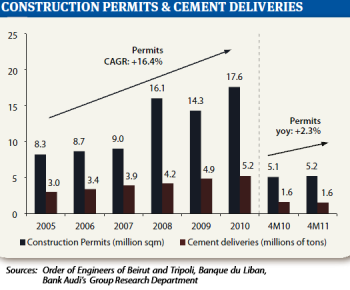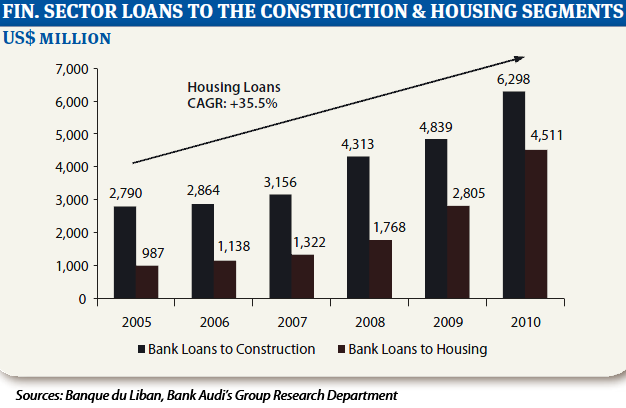
An interesting report published at the Heinrich Böll Stiftung Middle East institute by Waltraud- Frommherz-Hassib called “No Plan?…. Money rules” (links to PDF) reveals alarming issues concerning the lack of regulation of construction practices in Lebanon that are undermining the quality of life its people and are steering the country towards an environmental and urban disaster. Although it is hard to find news reports that explicitly confirm these highly political, legislative and institutional issues there is plenty of evidence on the impacts of boundless construction practices. Let’s look at these practices and what’s driving it.
The construction market
In 2008 the number of construction permits (an indicator of future housing supply) in Lebanon rose by an impressive 79 percent compared to 4.1% in the two previous years. It is true that this significant “jump” was likely due to efforts to repair the massive damages caused by the 2006 Hezbollah- Israel war, but the trend has largely persisted up till now.
Demand for expensive housing has also increased dramatically; this is one of the factors contributing to high inflation rates in Lebanon.
First, the rapidly expanding mortgage market is making loans readily available for both construction purposes and the acquisition of housing.
And second, businesses in real estate have been growing at an annual rate of 30% , attracting huge capital investments from the Gulf States and wealthy Lebanese expatriates, which have the tendency to think big.
Fantasies of building 3.3 km2 offshore islands and the extravagant cemintification of ideas are not only, in my opinion, “luxurious” monstrosities, but they are also threatening the environment and the architectural beauty of traditional housing.
Moreover the socio-economic is particularly severe for those Lebanese that live and work in the country year round, without the support of remittances (which are amongst the highest in the MENA region) and which now have to face an extremely inflated economic situation partially due to the rampant luxurious real estate market.
[youtube]http://www.youtube.com/watch?v=DyB_PL4qnHE[/youtube]
Construction Legislation and Regulation
The lack of effective regulation has greatly facilitated the unprecedented housing boom taking land management, urban planning and environmental management to a chaotic and uncontrollable stage. In Lebanon every land owner may legally build houses up to four stories high on 10 to 20% of the land no matter where the property is located (apart from nature reserves).
Furthermore, no public hearing or proof that there is a working sewer system of adequate size in place for example is systematically required; in fact, only 10% of construction plans follow a legally binding master plan that supplants national law on building regulations while 20% have non-legally binding plans. One is left to wonder about the design of the remaining 70% of construction plans, if there is any at all.
In theory The Council of Development and Reconstruction, an independent central planning authority created in 1977 to supersede the ministry and local authorities, is in charge of drafting and recommending basic guidelines for local master plans. Yet, the practical use of these are very limited because the guidelines are mere recommendations and they contain no legally binding rules or timelines.
Furthermore “risk assessments” of the environmental impacts of construction plans are all still relatively undeveloped and unenforced. The lack of legitimate enforcing parameters creates a situation of unrestrained building practices which undermine even the most basic and minimal levels of environmental quality standards.
Unbelievable stories like the one where a functioning wastewater treatment center in Jiye is still “waiting” to build a sewage system and as a result is dumping directly into the Mediterranean sea, highlights the gravity of lack of legally binding regulation in Lebanon.
Lack of demographic data
Another reason for unrestrained and haphazard construction plans is the lack of demographic data. The most recent official census available in Lebanon is that of 1932, the reason being that census data on the relative size of different religious groups could threaten Lebanon’s political status quo which is based on the size of the different religious groups. This means that currently there is no reliable and realistic information that reflects true population demographics to aid private investors make realistic real estate decision making and to help governments gauge real estate regulation and zoning plans. As stated in a publication by the Urban Land Institute.
“Demographics are the foundation of real estate decision-making. Population, household, and income characteristics – and the direction of future trends – determine whether demand will exist for new housing or retail space, and household mobility suggests where that new space should be built.”
This means that the housing market is largely based on unfounded speculation and the pertinent authorities have a limited vision on how to appropriately orchestrate such market in order for future generations to benefit. It is as if the quality of life has been completely overlooked and Lebanon is becoming a dumping site for cement blocks, what is worse this cement is being dumped anywhere and everywhere with little regard of the preceding cultural, historic and environmental resources.
Land registration
According to Waltraud- Frommherz-Hassib , a third of Lebanon’s land is not registered. Only politically and economically sensitive areas are land registered, such as the agricultural areas in the Beqaa valley, coastal areas, Beirut and the narrow strip along the road to Damascus. Areas such as Mount Lebanon, south of Beirut up to Sidon and north up to Baytroun are not land registered and so are up for grabs, in fact these are the areas with the highest construction rates in Lebanon. The lack of land registration may lead to a chaotic situation in the future. Land, particularly in a small country, risks becoming a serious subject of discussion where the property rights of poorer members of society are easily overlooked in a legal system that may well run into legislative and technical overdrive.
The impact on the environment
The result of the current system is unchecked urban expansions which devour the remaining natural lungs of the country. The Beirut Metropolis, for example, is spreading into a nature preserve which has been planned as a catchment area for the Beirut River, as well as an opportunity to create a recreational area in the suffocating city center. Inappropriate sewer systems have already contaminated the Jeita source, which provides 80% of Beirut’s water supply, yet notwithstanding such threats, national master plans do not explicitly seek to provide zoning or planning recommendations to protect the Jeita catchment area.
Quite the contrary, the area has become a hotspot for new construction.
To make things worse, in order to feed the construction boom, gravel and sand are required as primary resources. This is an additional factor among several others (land reclamation projects in Greater Beirut District, erosion caused by Egypt’s Aswan Dam which retains sediments that would otherwise reach eastern Mediterranean), which have been heavily depleting and destroying the mountains, river beds and coasts of Lebanon. Of the 250 km of coastline, only 49km of beach and 11km of cliffs still remain relatively intact.
To make things worse, many legal frameworks have not been adapted since the French mandate in the 1920’s leading to absurd situations. For example, according to Waltraud- Frommherz-Hassib, the penalty for operating an illegal quarry is an embarrassing 100 LL (68 US cents). Is this also why approximately 700 to 1300 illegally operating quarries are still happily scraping away?
To reiterate, this brief overview confirms that public goods and spaces in Lebanon are not only under threat because of the ruthless pursuit of profit making by an economic elite but also because there is a lacking weak state which facilitates such behaviors. Waltraud- Frommherz-Hassib highlights that Lebanon’s “weak state” is a symptom of “an overall political culture based on the interwovenness of economic and political elites along religious divides.”
As long as these conflicts of interests persist, the lack of real estate legislation and construction planning regulation will also persist. As long as the actions of decision makers are not held accountable, boundless and inappropriate construction will persist, and the major losers are the usual suspects: the environment and poorer members of society.
Above image: Aerial view Beirut from Shutterstock






This is nuts. They have energy shortage of monumental proportion. So they build large houses that require a lot of fuel to build and much more energy to operate. All electricity is rerouted to construction industry and you have to give electricity to population. So since no more electricity left no other industry can operate. And because you want to keep population employed you give more money to constructions industry. How long will this cycle go?